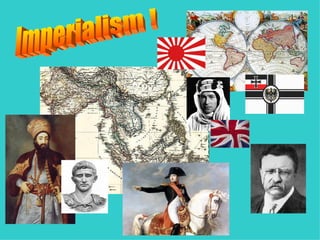Imperialism -Part I.
•
18 gefällt mir•1,572 views
First part of a lecture on imperialism -middle school level world history
Melden
Teilen
Melden
Teilen

Empfohlen
The Late Middle Ages in Europe and the Iberian Peninsula: the 15th century

The Late Middle Ages in Europe and the Iberian Peninsula: the 15th centuryMaría Jesús Campos Fernández
Empfohlen
The Late Middle Ages in Europe and the Iberian Peninsula: the 15th century

The Late Middle Ages in Europe and the Iberian Peninsula: the 15th centuryMaría Jesús Campos Fernández
Weitere ähnliche Inhalte
Was ist angesagt?
Was ist angesagt? (20)
Andere mochten auch
Andere mochten auch (11)
Interpretation of Yeats' "The Second Coming" World Lit II PTC

Interpretation of Yeats' "The Second Coming" World Lit II PTC
Ähnlich wie Imperialism -Part I.
Ähnlich wie Imperialism -Part I. (20)
Decline of Feudalism _ Rise of Nation States PPT.ppt

Decline of Feudalism _ Rise of Nation States PPT.ppt
UNIT 6 - Imperialism and the First World War (Presentation Part 1).pdf

UNIT 6 - Imperialism and the First World War (Presentation Part 1).pdf
2023.24 - UNIT 6 - Imperialism and the First World War (PPT).pdf

2023.24 - UNIT 6 - Imperialism and the First World War (PPT).pdf
Mehr von ljhsblog
Mehr von ljhsblog (20)
Imperialism -Part I.
- 2. “ The Sun never sets on the British Empire” The history of Empires goes back more than 4000 years...
- 3. Traditional Imperialism : Meant conquering your neighbors and expanding your borders, absorbing their peoples into your own
- 4. New Imperialism : Meant setting up colonies far from the home country & ruling over less advanced peoples (“ natives”) 1500’s -1945
- 5. Modern or new imperialism came about as countries evolved from medieval kingdoms into powerful, technologically advanced, NATION-STATES
- 6. Birth & Evolution of The State The State - a permanent, continuous, organized government separate from the Monarch - was born in Renaissance Italy Why? TRADE: Provided revenue for funding professional mercenary armies BANKING: Sophisticated financial organization, investment & credit WARFARE: Constant warfare forced, small, wealthy cities to seek an advantage over powerful feudal rulers like the Austrian Emperor , the Ottoman Sultan and the Kings of France and Spain
- 7. Evolution of the State 1400-1991 KIND OF STATE PURPOSE Princely State Legitimize ruler Kingly State Legitimize state Territorial State Expand power State-Nation Unify the Nation Nation-State Serve the Nation
- 8. The Nation-State Built Empires
- 9. Causes of Imperialism NATIONALISM: A strong feeling of pride or superiority about your nation. Began with the FRENCH REVOLUTION . MILITARISM: Glorification of war, courage and military skills. The Army and Navy are usually large and well-funded. PROTECTIONISM: High tariffs and other trade barriers prevent nations from trading freely and create economic problems that nations try to solve by acquiring colonies
